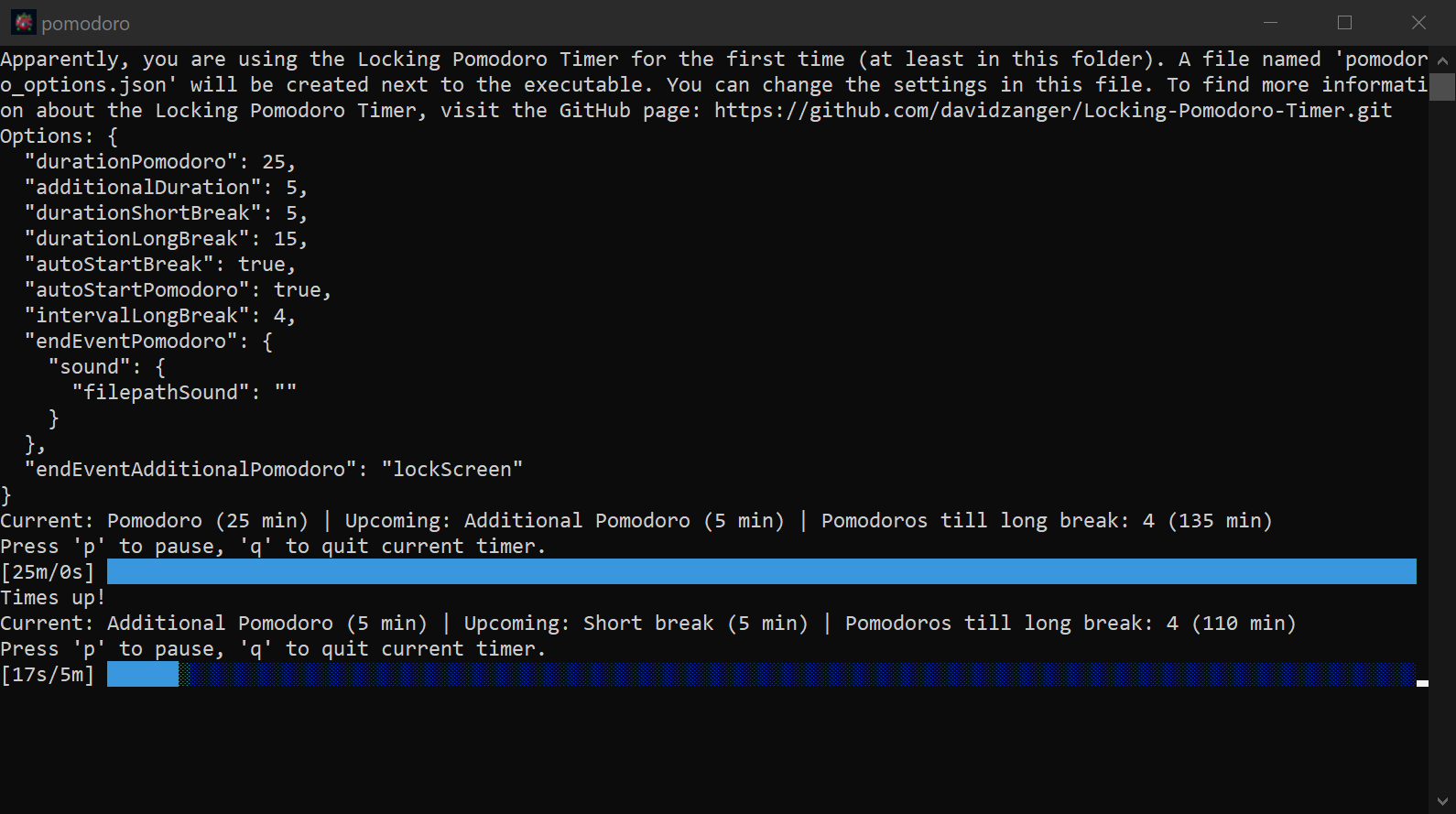[![Contributors][contributors-shield]][contributors-url] [![Forks][forks-shield]][forks-url] [![Stargazers][stars-shield]][stars-url] [![Issues][issues-shield]][issues-url] [![MIT License][license-shield]][license-url] [![LinkedIn][linkedin-shield]][linkedin-url]
Table of Contents
-
About The Project
-
Getting Started
- Usage
- Roadmap
- Contributing
- License
- Contact
- Acknowledgments
## About The Project

There are many Pomodoro timers available on the web, however, I couldn't find one that would lock the screen. I wanted to create a simple Pomodoro timer that would lock the screen after a certain amount of time as just a sound notification wasn't enough to really stop me working.
The [Pomodoro technique](https://en.wikipedia.org/wiki/Pomodoro_Technique) is a time management method that uses a timer to break down work into intervals, traditionally 25 minutes in length, separated by short breaks. This technique is used to improve focus and productivity.
### Built With
[![Rust][Rust]][Rust-url]
(back to top)
## Getting Started
### Download Executable
The easiest way to use the Pomodoro timer is to download the executable from the [releases](https://github.com/davidzanger/Locking-Pomodoro-Timer/releases) page and run it on your machine.
If you want to build the project yourself, follow the instructions below.
### Prerequisites
Install Rust by following the instructions on the [Rust website](https://www.rust-lang.org/tools/install).
### Installation
1. Clone the repo
```sh
git clone https://github.com/davidzanger/Locking-Pomodoro-Timer.git
```
2. Build the project
```sh
cargo build --release
```
3. Use the executable which can be found in the `target/release` directory.
(back to top)
## Usage
To use the Pomodoro timer, simply run the executable. On the first run, the program will create a `.json` file next to the executable which will store the settings for the timer. The settings can be changed by editing the `.json` file.
The default settings are as follows:
```json
{
// The duration of a single Pomodoro session in minutes.
"durationPomodoro": 25,
// The additional duration in minutes to be added to a Pomodoro session when it is over.
"additionalDuration": 5,
// The duration of a short break in minutes.
"durationShortBreak": 5,
// The duration of a long break in minutes.
"durationLongBreak": 15,
// Flag indicating whether to automatically start a break after a Pomodoro session ends.
"autoStartBreak": true,
// Flag indicating whether to automatically start a new Pomodoro session after a break ends.
"autoStartPomodoro": true,
// The interval in number of Pomodoro sessions after which a long break should be taken.
"intervalLongBreak": 4,
// The end event to be executed after a Pomodoro session ends.
"endEventPomodoro": {
"sound": {
"filepathSound": ""
}
},
// The end event to be executed after the additional Pomodoro after a Pomodoro session ends.
"endEventAdditionalPomodoro": "lockScreen"
}
```
For the `endEventPomodoro` and `endEventAdditionalPomodoro` fields, the following options are available:
- `sound`: Play a sound file. The path to the sound file must be provided in the `filepathSound` field. If the path is empty, the default sound will be played.
- `lockScreen`: Lock the screen. This feature is currently only available on Windows.
_For more details, please refer to the [Documentation](https://docs.rs/crate/locking-pomodoro-timer/latest)_
(back to top)
## Roadmap
- [ ] Create a GUI for the timer.
See the [open issues](https://github.com/davidzanger/Locking-Pomodoro-Timer/issues) for a full list of proposed features (and known issues).
(back to top)
## Contributing
Contributions are what make the open source community such an amazing place to learn, inspire, and create. Any contributions you make are **greatly appreciated**.
If you have a suggestion that would make this better, please fork the repo and create a pull request. You can also simply open an issue with the tag "enhancement".
Don't forget to give the project a star! Thanks again!
1. Fork the Project
2. Create your Feature Branch (`git checkout -b feature/AmazingFeature`)
3. Commit your Changes (`git commit -m 'Add some AmazingFeature'`)
4. Push to the Branch (`git push origin feature/AmazingFeature`)
5. Open a Pull Request
(back to top)
## License
Distributed under the GPL-3.0 License. See `LICENSE` for more information.
(back to top)
## Contact
Project Link: [https://github.com/davidzanger/Locking-Pomodoro-Timer](https://github.com/davidzanger/Locking-Pomodoro-Timer)
(back to top)
[contributors-shield]: https://img.shields.io/github/contributors/davidzanger/Locking-Pomodoro-Timer.svg?style=for-the-badge
[contributors-url]: https://github.com/davidzanger/Locking-Pomodoro-Timer/graphs/contributors
[forks-shield]: https://img.shields.io/github/forks/davidzanger/Locking-Pomodoro-Timer.svg?style=for-the-badge
[forks-url]: https://github.com/davidzanger/Locking-Pomodoro-Timer/network/members
[stars-shield]: https://img.shields.io/github/stars/davidzanger/Locking-Pomodoro-Timer.svg?style=for-the-badge
[stars-url]: https://github.com/davidzanger/Locking-Pomodoro-Timer/stargazers
[issues-shield]: https://img.shields.io/github/issues/davidzanger/Locking-Pomodoro-Timer.svg?style=for-the-badge
[issues-url]: https://github.com/davidzanger/Locking-Pomodoro-Timer/issues
[license-shield]: https://img.shields.io/github/license/davidzanger/Locking-Pomodoro-Timer.svg?style=for-the-badge
[license-url]: https://github.com/davidzanger/Locking-Pomodoro-Timer/blob/master/LICENSE.txt
[linkedin-shield]: https://img.shields.io/badge/-LinkedIn-black.svg?style=for-the-badge&logo=linkedin&colorB=555
[linkedin-url]: https://linkedin.com/in/david-zanger-8a4340137
[Rust]: https://img.shields.io/badge/Rust-000000?style=for-the-badge&logo=rust&logoColor=white
[Rust-url]: https://www.rust-lang.org/

